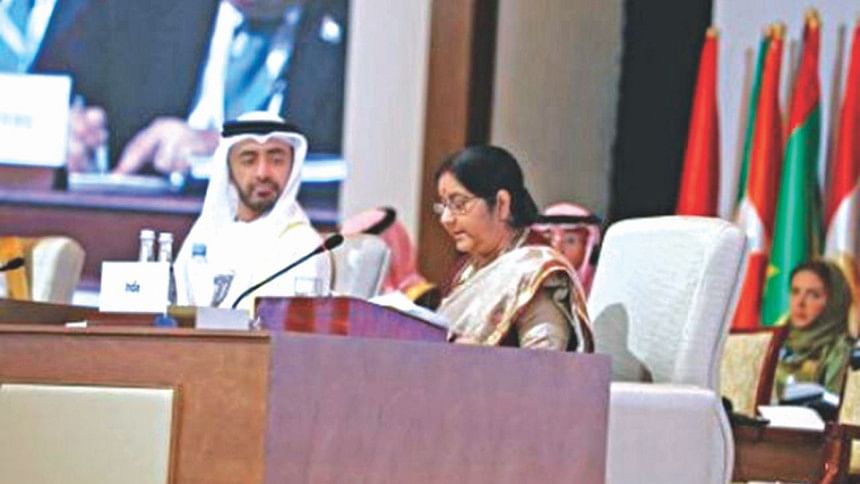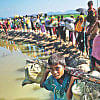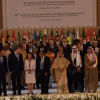46th OIC-CFM: Reform or aberration?

The 46th session of Council of Foreign Ministers (CFM) of Organisation of Islamic Cooperation (OIC) was held in Abu Dhabi, UAE from March 1-2, 2019 with the motto "50 years of Islamic Cooperation: Roadmap for Prosperity and Development". Established in 1969 the session also celebrated the golden jubilee of the 57-nation organisation now having nearly 2 billion people.
The conference was held in the backdrop of two persistent intra-Umma tensions—Iran versus the Gulf States and Pakistan-India. Actually the conclave came at a time when real war stared the two nuclear-armed-neighbours of South Asia in the face.
The most significant development at the conference was the presence of Indian External Affairs Minister Sushma Swaraj at the inaugural session. This was unprecedented in the organisation's 50-year history.
Host of the Conference UAE Foreign Minister Sheikh Abdullah bin Zayed Al Nahyan issued an invitation to his Indian counterpart as "the guest of honour" and because of "its important Islamic component". Indian government described the invitation "as a milestone in our comprehensive strategic partnership with the UAE". Indian media called it a diplomatic coup—against Pakistan.
For Pakistan, Sushma Swaraj's presence at the CFM could not have come at a more inopportune time considering the developments following the Pulwama incident. There was a diplomatic flurry over this unusual invitation. The OIC Secretary General as well as the foreign ministers of Turkey and Iran were not aware that Indian external affairs minister will be addressing the inaugural session. Foreign ministers of Turkey and Iran decided to skip the conference, although for different reasons.
Pakistan, which has consistently opposed India's inclusion in OIC, reacted strongly against UAE's decision to invite the Indian external affairs minister. Pakistan's parliament also passed a resolution that foreign minister Shah Mahmood Qureshi refrain from attending the conclave. Qureshi told the UAE Foreign Minister that the invitation to India "was extended without consultation with member states and contrary to the rules of the OIC."
Actually the invitation was issued much before the Pulwama. Qureshi demanded that UAE withdraw the invitation, but Zayed Al Nahyan refused to reverse his decision. Qureshi was so peeved that he decided to boycott the meeting. Pakistan sent a senior level delegation to oppose any attempt by the CFM to grant India observer status.
In her placatory speech at the conference Sushma Swaraj said she carried greetings from 1.3 billion Indians, including more than 185 million Indian Muslims. She quoted liberally from the Holy Koran, Rig Veda, Guru Granth Sahib, Mahatma Gandhi and others and tried to project India's secular credentials and democracy. Swaraj elaborated how India developed friendly relations with most Arab countries over the past decades.
Without mentioning Pakistan Swaraj said, "The fight against terrorism is not a confrontation against any religion... If we want to save the humanity then we must tell the states who provide shelter and funding to the terrorists, to dismantle the infrastructure of the terrorist camps and stop providing funding and shelter to the terror organisations."
There were two glaring omissions in the Conference Declaration. Firstly, the document did not mention anything about the speech of Sushma Swaraj and secondly, there is no paragraph on Kashmir.
It was quite odd that the declaration did not thank the "Guest of Honour" for her speech. One wonders whether the oversight was engineered by Pakistan. Pakistan sponsored paragraphs on "Indian atrocities" in Kashmir has been a regular feature in past OIC Declarations.
To make up for this serious omission Pakistan moved a separate resolution (No1/46-MM), which reaffirmed OIC's unwavering support for the Kashmiri people in their just cause. According to Pakistan Foreign Ministry the resolution reiterated that, "Jammu and Kashmir remains the core dispute between Pakistan and India and its resolution is indispensable for peace in South Asia. It condemned in the strongest terms recent wave of Indian terrorism in Occupied Jammu and Kashmir and expressed deep concern over the atrocities and human rights violations in Indian occupied Kashmir." Though this resolution is not a part of the declaration, Pakistan shall find solace that a separate but stinging declaration on Kashmir was adopted by the CFM. India overlooked this special resolution and remained upbeat that it has made a strong foray at OIC.
India probably deserves to be a member of OIC given the size of its Muslim population. Several Muslim minority states are currently members of OIC. At the 45th CFM held in Dhaka in May 2018 a proposal to grant observer status to India was mooted by Bangladesh, which was blocked by Pakistan and several others.
Delhi is probably not aware that getting a berth at OIC will entail great responsibilities with regard to its policies and attitudes towards its minority Muslim community. Just by becoming OIC member India will not be able to escape serious criticism on what is happening in Kashmir in the name of eliminating terrorism. India will have to stop military operations against civilians in Kashmir, curb communal violence against Muslims, and ensure all basic civil and human rights to this minority community. The debates over Kashmir was so far one-sided—Pakistan accusing India from OIC pedestals. If India gains a seat at OIC, Pakistan-India debates will move inside OIC forums.
Bangladesh will be satisfied that the declaration refers to the Rohingya issue in paragraph 23. But the separate resolution No 4/46-MM on the situation of the Muslim community in Myanmar was exhaustive in its strong condemnation of Myanmar's atrocities on Rohingyas. It called upon Myanmar to take effective steps to stop the genocide and repatriate the refugees from Bangladesh.
Given the way this conference was held one wonders whether the 46th CFM was an aberration or if it will set the tone for reforms in OIC and allow India and probably China, both with huge Muslim population, to get observer status.
Mahmood Hasan is former Ambassador and Secretary.










Comments